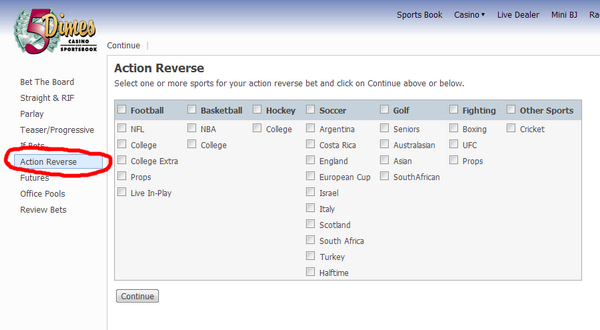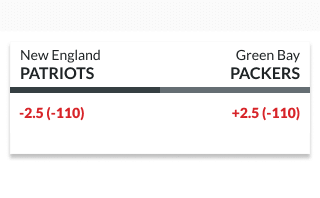Action Reverse Bet
A reverse bet is a series of IF bets going both forward and in reverse order. Each team included in the reverse bet will pair with the other team in order to form two IF bets. For Example: (using Football and Baseball): The First Part: Philadelphia Eagles -8 $110 to win $100 Double Action (If win, push, no action, or cancelled) Then. Bankroll management: If you prefer to manage your bankroll, win reverse bets are more favorable. The difference is that you have action on the second bet if your first bet wins ties or is canceled. In this type of if be you don't have the option to use your potential winnings from the first. Reverse Bet Blog Post: http://www.instagram.com/mikev. An action reverse bet is two or more if bets that structure multiple individual bets in a causal sequence. In an if bet, if the initial line or wager wins, the next bet in the sequence is automatically placed. If the initial line or wager loses, no additional bets are placed.


Although the parlay is a very popular bet, there are two other versions of this wager that sports bettors should consider. Many online books offer if bets and reverse bets and both can provide the sports bettor protection from loses while allowing them to make some cash. Here’s a look at both the if bet and the reverse wager.
An if bet is similar to a parlay in that you are wagering on numerous teams and putting them on one ticket. However, the if bet offers sports bettors protection that a standard parlay bet does not. With a parlay wager, you must be right on all games or else you lose the entire amount of your wager.
Let’s say you make a two-team parlay bet. Both teams must win for you to collect. It’s either all or nothing. In a parlay, let’s say your first team loses. The action on the second game is still ongoing but it doesn’t matter because you’ve already lost the first game and, thus, you have lost the parlay. The if bet works differently.
What Is A Reverse Bet
When you bet on two-teams with an if bet, the second bet is only in place “if” you win the first. Thus, let’s say you put $110 on the Pats in the first game and they win, then your second team, we’ll say it’s the Bears, will see action and $110 will be placed on them. However, let’s say your first bet on the Pats goes south and you lose. The second wager on the Bears will not see action, since you cannot win the two-team bet. The result is you save $110.

With a two-team wager using the if bet, you can lose $110, come close to breaking even if your first team wins and the second loses, or win both games and take home some cash. Depending on how you play the if bet, you can win anywhere from $200 to just over $300. The payout on a $110 two-team parlay would be around $286.
With the parlay, you risk less cash to get a bigger payout. But it is an all or nothing bet. A $110 parlay pays 13-5, while an if bet offers you basic spread odds with the opportunity to load money won from the first wager into the second wager. So sports bettors need to decide whether they want to take a greater risk with the chance of seeing a bigger payout or take less of a risk with the opportunity to win less cash.
By the way there is one feature of the if bet that some people do not like. It is similar to the parlay in that once you make the wager, you cannot take back the second bet if the first wins. Sometimes a sports bettor will win the first game and then have second thoughts about game two. Because in essence they are using a form of parlay wagering where both games are on the same ticket, they cannot change that wager. However, if the sports bettor had played a single point spread bet on the Pats and won, they could have waited to make the second bet on the Bears and, if they had ill feelings about it, not made it at all. Thus, there is still more risk in playing an if bet than there is in placing two single team wagers. Thus, it’s a good idea to save your if bets for games that offer true value.
Sports bettors are always looking for any edge that they can get and some have found that edge in the reverse bet, which is less risky than the if bet. Of course, the lower the risk the less the payout. Thus, the reverse bet does not offer the same type of cash as the if bet or the parlay.
The reverse bet is simply a double-action if bet. With the reverse bet you would put $110 on the Pats in game one and $110 on the Bears in game two. You then reverse that bet, placing the Bears on the first part of the ticket and the Pats on the second half of the ticket.
Here’s the way it works. If both teams win, you’ll see a profit of around $400. If one wins and the other loses, you would lose $120 and if both lose you’re out $220. A push sees you make $200. This is a four-team parlay using two clubs but without the parlay odds, which stand at 12-1. The protection you get by using the reverse bet lowers the pay off substantially.
If bets and reverse bets are useful if you are on a losing streak or of you’re winning between 50% and 55% of your wagers. If you’re doing well on single point spread bets, winning more than 55%, or cleaning up on two-game and three-game parlays, then stick with them. The if bet and the reverse bet are methods for cutting losses and making a minimum profit. Use these to your benefit. They can help stabilize a precarious situation and turn losses into winnings.